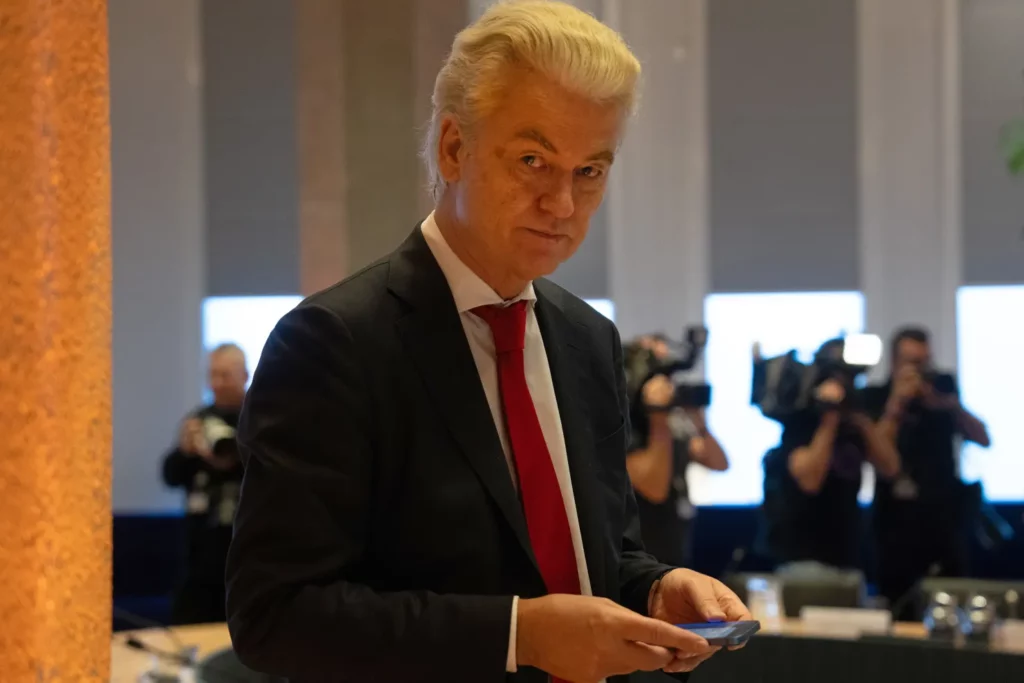
In a stunning election victory in the Netherlands, Geert Wilders, the leader of the right-wing Party for Freedom (PVV), has emerged triumphant, securing 23.6% of the vote and doubling his party’s seat tally to 37. This unexpected surge has triggered jubilation among populist leaders across Europe, raising concerns within the political mainstream.
Viktor Orban, Hungary’s nationalist prime minister, heralded the result as a sign of changing winds in European politics. Marine Le Pen, leader of the right-wing National Rally in France and Wilders’ close ally, expressed optimism about reshaping the European Union into a “Union of European Nations.” Far-right leaders across the continent, like Tom Van Grieken in Belgium, see this as a harbinger of success for their own parties.
Wilders, often compared to the “Dutch Donald Trump,” is known for his anti-EU and anti-immigration stance. His victory, marked by the PVV winning over 20% of the Dutch assembly vote, reflects a significant shift, considering no extreme-right party has achieved this level of support in the country before.
While Wilders is now in a strong position for coalition talks, the path to forming a government and becoming prime minister appears complex. He needs the support of at least two other parties to secure a majority in the lower house, a challenge as some, including the second-place Labor-Green alliance, have ruled out collaboration.
In his victory speech, Wilders pledged to address what he termed the “asylum tsunami” affecting the Netherlands. His anti-Islam rhetoric, shaped by experiences in the Middle East and time spent in Israel, has drawn criticism at home. Wilders and his wife have lived under tight police protection since 2004 due to his provocative views.
The election result underscores a growing discontent with immigration and economic challenges blamed on the political elite. Wilders’ appeal extends to a younger generation, winning the most votes in the 18-35 age group.
With far-right leaders in power in Hungary, Italy, and Slovakia, a solid bloc of Eurosceptic-leaning parties is emerging in Europe. The rise of far-right parties in France, Germany, and Spain signals potential unrest in the coming years.
The election campaign was dominated by the issue of mass migration, particularly from Africa and the Middle East. Wilders’ win, despite a somewhat softened tone, reflects the potency of immigration as a campaign issue amid Europe’s struggles with irregular migrants, asylum seekers, and refugees.
The normalization of far-right positions by mainstream parties has contributed to Wilders’ electability. Mimicking tough stances on immigration and rolling back promises not to coalition with him played into his hands, according to Johannes Hillje, a German electoral strategist.
This result is part of a worrying trend of fragmentation and polarization within Europe, challenging mainstream parties, especially on the center-right. The EU faces the difficult task of addressing political discontent and demonstrating its ability to solve social problems for a fair and just climate transition.
Regardless of whether Wilders becomes prime minister, the implications of his party’s majority in parliament may harm European unity on Ukraine. Wilders, with previous pro-Kremlin leanings, may complicate negotiations on support for Ukraine and sanctions on Russia.
As Europe grapples with these shifts in political dynamics, the continent faces a critical juncture that will shape its future trajectory.
